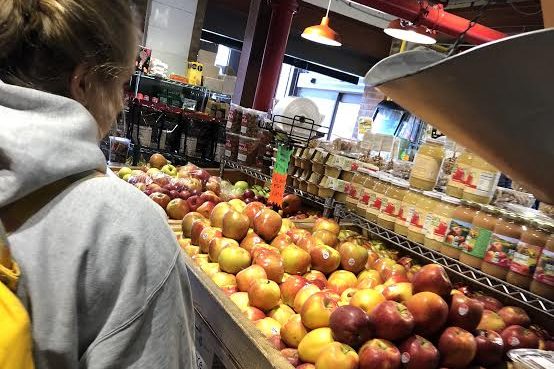Is buying organic foods worth the extra cost?

Within the past 20 years, buying organic food seems to have sprouted into something more than just eating healthy. Buying organic foods has started to become a trend sought after across the country. Ever since organic foods have hit mainstream grocery stores, it has become all the rage to have the cleanest, freshest, and most pesticide-free foods thrown in your cart. With this being said, prices of these foods have begun to skyrocket because of their so-called great health benefits.
Today when we see organic stamped on a label, we tend to assume that it must be healthy. According to Nancy Burke, a dietitian at the University of Michigan, this isn’t necessarily true.
“Read food labels carefully, just because a product says it’s organic, doesn’t mean it’s the ‘healthier alternative.’” Burke said. “The product could still be high in sugar, salt, fat, or calories.” Many do not realize that just because a product is labeled organic does not mean that you are consuming something that is beneficial to your health. There is no reason to be spending up to double the cost that you would be spending on conventional foods to buy something that is not actually organic.
Organic foods seem to be a very controversial topic, but the main source of issues arise from the idea that conventional fruits/vegetables can cause cancer. “There have not been any studies that prove eating organically can help prevent cancer or other diseases.” Burke said.
The American Dietetic Association seems to be in agreement with Burke, as they also claim that “there haven’t been any studies to show that organic foods can prevent cancer or other diseases, any more effectively than conventionally grown foods.”
Setting aside prices and overall quality of organic vs. conventional foods, many people eat organically in order to protect the environment. Oftentimes buying organic has to do with the morals of the person buying the foods. This could have to do with their concerns on the environment, pesticides or animal welfare.
This opinion is valid, but for many Americans who spend extra money on something that does not show substantial health benefits, it is simply not worth it.
With this being said, Jen Mamer, a strictly organic consumer, has advice for those who only eat partially organic. “It can be expensive to buy all organic food, so I try to focus on the “Clean 15” since they contain the lowest levels of toxins: avocados, sweet corn, asparagus, peas, onions, broccoli, cauliflower, cabbage, eggplant, pineapple, papaya, mango, kiwi, honeydew, and cantaloupe,” Mamer said. “I try to avoid the “Dirty Dozen” since they have the highest toxic load: strawberries, peaches, nectarines, pears, apples, grapes, cherries, spinach, sweet bell peppers, potatoes, celery, and tomatoes.”
Burke has a few tips to offer whether buying all organically or strictly conventional: “Select a variety of foods from a variety of sources, this gives a better mix of nutrients and reduces likelihood of exposure to a single pesticide,” Burke said “Wash and scrub all fruits and vegetables thoroughly under running water, and remove outer leafy layers to reduce contaminants.”
Organic foods are often much pricier than what they should be. Whether you are buying conventional or organic, there will still be traces of pesticides. Opting for normal fruits and vegetables will not make any proven substantial difference in your health.








